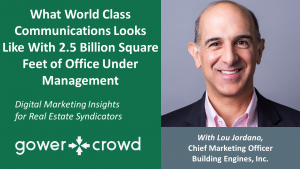WHITE BOARD WORKSHOP
Need More Money to Finance Your Real Estate Projects?
Learn how to find more investors, raise more money, and finance your real estate projects online.
Gregory Freedman, BH3 Co-Founder
Understanding Opportunities for Distressed Real Estate in 2020
Gregory Freedman

The simple fact is that real estate comes in cycles. It doesn't matter what causes it to go down: Economic recession, lax banking regulations, irrational exuberance, or COVID-19. Savvy investors and developers know that real estate always goes down in value at some point and when we see prices adjusting to a new normal, the weaker players and their investors get wiped out, while others step in to take their place.
Discover in this episode how Greg and his team at BH3 are looking for opportunity to emerge from chaos and how you can be a part of that program.
What You're Going to Learn
- Defining Distress in the Real Estate Market
- Comparing Real Estate Distress from 2008 to Our Current Crisis
- Evaluating the Health of Lenders and CRE Deals During COVID-19
- How “Speed of the Deal” is a Competitive Advantage for BH3
- The Best Time to Buy Distressed Debt During a Financial Crisis
- Commercial Real Estate is Like Turning a Cruise Ship
- The Low Hanging Fruit of CRE Opportunities Post-COVID-19
- How Underwriting Standards May Change After the Coronavirus Crisis
- The Human Side of Real Estate During COVID-19
- And much more!
Listen To or Watch the Full Podcast Here
Show Highlights
Evaluating the Health of Lenders and CRE Deals During COVID-19
ADAM GOWER: But you're making a distinction between non-bank lenders and banks. Is that right? That have emerged over the last 10 years. And the distinction is, is that banks are much more healthy than they were last time, clearly. But the non-bank lenders that have entered the market are ill-equipped Is that right? Is that what you're looking at, basically?
GREG FREEDMAN: So, yes. On a macro-level, yes. But what it requires is looking at a micro-level. And when I'm talking about banks, I'm really talking about domestic banks here, your big household names, included in that group of tourist lenders or new entrants into the marketplace. There are certainly some banks in there, mostly out of Asia or Europe that came into this space in a big way. The one big non-performing loan that we bought in 2019 was from United Overseas Bank, which is a Singapore-based bank. And in that capital stack, there was Chinese entities all up and down the capital stack, outside of that senior loan. But what I'm really talking about, on a micro-level, in terms of, there's good actors.
I don't know if you're familiar with this, but when the government came out with the TALF, and, kind of, buying corporate paper, they came up with this concept of "fallen angels", which was good companies, good companies, that were downgraded just because of the pandemic, for no other reason whatsoever. So if you took a similar philosophy and applied that on a micro-level to real estate, there's good borrowers, meaning, hey, they have great assets or good sponsors or good operators, hotel, retail, multi-family office. But, there's a dislocation today, purely because of the pandemic and no other reason. That's one bucket and that the path to recovery for them is a very different strategy where it's, hey, the lenders are going to work with them or we're going to work with them if we inherit those senior loan positions and kind of giving them the latitude and the runway to recover. Then there's another bucket where they were highly leveraged, highly structured deals to begin with.
They were probably already on the margin in 2018-2019 that this pandemic just, kind of, brought forth the reality of what was already going to be.
And again, just that note that we bought in 2019 was on under 125 Greenwich Street. Great sponsor, but highly structured capital stack where the actual developer and sponsor of the deal, probably only had about two and a half or three percent of the total equity in the deal. There was senior debt, there was sub-ordinate debt, there was mezzanine debt, there was preferred equity, there was common equity and then non- common equity. That was syndicated to a lot of folks as well. So in those highly structured deals, where, in a rising tide environment, those guys win and make a lot of money doing it and they have. In any catalyst of a downturn, those guys are out of business. And we think that a lot of those people, that already had pain, when I say out of business, out of that deal, their equity is worth zero. Their equity is probably already worth zero and that's moving up the trough in the capital stack where the pref equity is wholly or partially impaired, and then the mezz and then you get to the senior loan. And we've done very well buying great senior loans at par where there's a tremendous amount of equity left in the deal. We've also bought dozens and dozens of senior loans that were highly levered at significant discounts to get back to reality.
FOR REAL ESTATE DEVELOPERS
THE WHITE BOARD WORKSHOP
Learn the exact system best of class sponsors use to raise money online.
Commercial Real Estate is Like Turning a Cruise Ship
GREG FREEDMAN: You have to remember that, in the CMBS bond world, you can look on the Bloomberg screen and it's in real time, but that's not how real estate actually works. And I'm always reminding people that April 1st, which was, what, three and a half weeks ago, was the first period of collections during corona. Right? This is new. This is completely new.
ADAM GOWER: Exactly.
GREG FREEDMAN: And we were saying in the middle of March, hey, kind of ignore April collections because they're not going to be really indicative of how deep this crisis may be. And May and June are really going to be better telltale signs. So, you know, again, on a micro-level, on some of our multi, where demographics are off the charts and household incomes are again, off the charts, we had 92% percent collections. But then, on some of the lower end multi-family stuff or the rent stabilized rent control, yeah, that number was significantly less. So it's going to be interesting. And real estate is like turning a cruise ship where, you know, especially the stuff that's in CMBS. You don't pay for 30 days. They send you a little nice reminder. You got 60 or 90 days. They send it to the special servicer. Then they onboard it and they're going to order their valuations, and at that point, the special servicers, or the repo guys are going to say, hey, we need updated values and getting updated values today is a tricky thing because no one knows how to value anything right now in terms of appraising assets, because there still isn't clarity on the medical crisis side. And until that happens, I think that it's going to be a tumultuous time to try and pick and choose your spots without that clarity. And again, we think that that's probably late summer or even beyond.
FOR REAL ESTATE DEVELOPERS
THE WHITE BOARD WORKSHOP
Learn the exact system best of class sponsors use to raise money online.
The Low Hanging Fruit of CRE Opportunities Post-COVID-19
ADAM GOWER: Greg, crystal ball. Where do you think the biggest opportunities are going to emerge?
GREG FREEDMAN: So the low hanging fruit that everyone's talking about, is obviously hospitality and retail. Retail was already suffering before this. So we, as a firm, have a strong conviction that the retail landscape is going to be forever, and let's classify forever, as, kind of, the next decade change. We think it's going to look a lot different than it did 60 or 90 days ago. So retail, for sure, again, was already enduring pain to begin with. Hospitality. Hotels were doing well. 2018-2019. 2020 was expected to be a generally flat year.
They got crushed. And they're going to continue to get crushed because they sell by the day. They don't have a 10-year credit tenant, they're selling by the day and there's gonna be a lot of pain there and that's going to take time to get back.
There's not this V-shape recovery snap and the hospitality, in our opinion, again, on a macro-level. On a micro-level, certain hotels are going to do better than others in terms of resorts, because people will be wanting to get out of the house, maybe drive to destinations will do better than they did historically because people don't want to travel. People aren't going on cruise ships necessarily. So hospitality is going to endure a lot of pain in our opinion. But we think that the pandemic and the impact of the pandemic on commercial real estate is generally asset-class agnostic, with the exception of, you know, last mile distribution for guys like Amazon and stuff like that. It's going to impact everyone, just at certain degrees, you know. We don't know what, you know, office space requirements are going to look like for companies. And there's actually good arguments to have on both sides, which is, there's a hey, a bunch of our people could actually work from home. So we need less. And the counterargument to that as well, actually, if you're going to have office space, you need more of it because you've got to space people out. They can't be on top of each other.
ADAM GOWER: You need more per person, exactly.
GREG FREEDMAN: This whole thing about communal and everyone being on top of each other is going to look very different on the back end of this thing. So, you know, office is going to see some changes and we're going to adapt. We're an adaptive society and multifamily is historically the safest asset class. We believe it still will be the safest asset class.
But there is a lot of froth in that space.
Where it had become heavily commoditized and people were building or buying to return on cost margins that just, we didn't find compelling. And it doesn't take much.
It takes a blip on the radar, not even a pandemic, to basically eviscerate a lot of equity from that stuff. If there is, you know, 50 or 75 basis point movement in cap rate and you know, there's no rent growth or there's rent contraction by 10 percent.
The equity is worth zero.
How Underwriting Standards May Change After the Coronavirus Crisis
GREG FREEDMAN: We're investing very strategically. We're not investing a lot right now. I'll tell you that much. We've looked at probably 100 deals in the past three or four weeks. There's only two that excite us. So we're investing from, kind of, a fear-based mentality today, kind of saying, A. things are going to get worse and we need to stress test that and B. on the back end of this thing, we do not believe that underwriting standards on a buy or a sale are going to look the way they looked 60 days ago. Generally think that cap rates are going to hold steady because Boston Capital has gone down, with some deviation to that.
But from an underwriting standpoint, in terms of income and expenses, I think that's going to look really different. In terms of vacancy and loss collection, in terms of expense growth, in terms of no rent growth or some rent contraction. In terms of reserves, every deal is being, kind of, looked at the same. Oh, five percent occupancy and a five percent cap rate on an exit, that will always stand the test of time. That's not accurate today.
So I think that where, you know, if NOI was going to be a million dollars under old underwriting standards, at a five cap, puts it at a 20 million valuation.
I think that the five cap will probably hold, but it'll be underwritten based on nine hundred thousand dollars of NOI, or eight hundred thousand dollars NOI versus that million bucks.
The Human Side of Real Estate During COVID-19
ADAM GOWER: We were talking about the difference between now and then and the then is, of course, the 2008 downturn. And now, it's a terrible thing because there's a health consequence to people really suffering. It's a terrible environment and we're all personally fearful of that. Right? I mean, it reaches into all of us and it's affected all of our lives. On the other hand, during the last downturn, there was a similarity and that similarity was, looking back on it, that people were being kicked out of their homes. There was a human aspect to it, 12 years ago also. But bringing capital back into the market to help, you know, refinance some of these deals is what's so exciting to me right now. Here, let me ask you this question. How do you finance your fund? So you talked about having a distressed debt fund. So, how do you capitalize that? What's your structure so that when you're in at a bank, you know, you've got the money to be able to close on Friday.
GREG FREEDMAN: So, before I respond to that, going back to the comparison to 2008 on a human level. You're a thousand percent accurate, but it was also isolated because of the credit crisis that was predominantly derived from the residential mortgage space, right? But while that was happening, people were still operating. They were still traveling. They were still going to restaurants. They were still, society as a whole was was still operating. Right?
And the difference here, and it's, look, it's fascinating because, you know, my partner Dan and I speak about this often.
I don't know of another time in recent history where the whole world, forget about your political affiliation or your religious affiliation.
The whole world is focused on the same issue. That's powerful and I think that it's great for unity and, kind of, recognizing what's actually important in the world.
But, it's the only time, comparing it to 2008 where everything stopped. Right? No one underwrote a zero. Right? People underwrote, oh well, the hotel may be off an occupancy or seasonality or we may not lease up apartments at the same pace. No one on the road, a hard stop or a zero.
And that's something that is new for everyone. So, yes. On a human level, it's also very different this time around because people are dying in mass.
And while there is a lot of pain felt by a lot of people during the credit crisis, it wasn't causing their death or their demise. Right?
They would lose their homes and we never invested in the residential space or the primary single family home space because it was very recent.
There's a distinct difference between foreclosing on, or recapturing a property from a sophisticated landlord or office owner, a developer, versus kicking someone out of their home. That's a very different business and requires a different mentality and approach and something that we have zero interest in participating in, just from a moral standard standpoint.
So, there is a distinct difference between now and 2008.
We think it's much worse now because of the death, but because of the lasting impacts that it's gonna have from this. Because we're not just going back to normal. They're talking about reopening certain things on Wednesday here in Florida. And restaurants, a lot of restaurants are not going to come back. Or if they come back, they're going to fail because they can't survive at 25 percent or 50 percent occupancy. So it is different in that respect across all asset classes.
Related to this episode:













